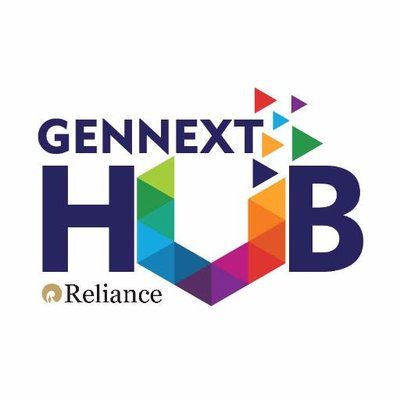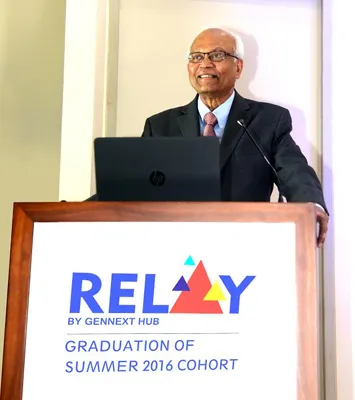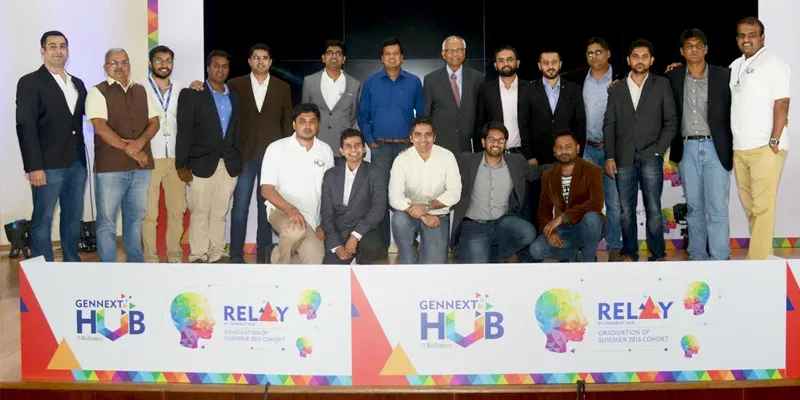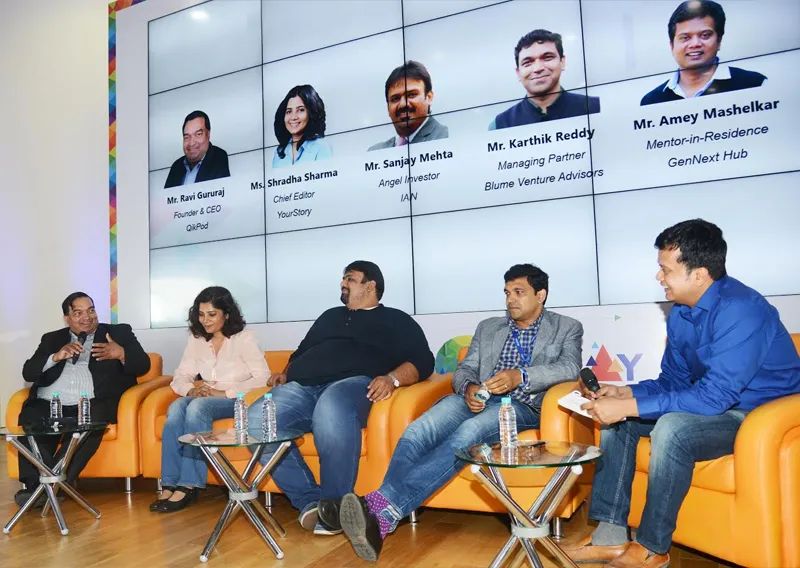
GenNext Hub
View Brand PublisherThe fourth Industrial Revolution, reducing degrees of separation, and you: The Gennext Hub Relay’s Demo day was tech and startup geek heaven
“Digital inclusion, not digital exclusion and elitism, is the goal of Digital India.” This was the clarion call raised by Dr. RA Mashelkar at GenNext Hub Relay, the graduation ceremony of the cohort of startups that joined Reliance Industries Limited’s (RIL) ‘scalerator’ programme, in the summer of 2016. “It is time that India be viewed, not just as a land of ideas, but also of opportunities,” he continued, to a roaring crowd, as participants and patrons attempted to chart a roadmap of how the startup wave in India needs to be prolonged into a relay and a marathon, and not just a sprint.
Through its GenNext Hub, RIL has been catalysing a unique startup ecosystem, which rests on the tripod of their 3 Ts - talent, technology and trust. “This venture is aimed at spotting and encouraging ‘talent’, helping them harness their ‘technology’, and backing them by putting total ‘trust’ in them,” says Mashelkar. The third batch comprised nine startups selected from a pool of over 500 applications, from across the length and breadth of India, and abroad. The final nine were all registered entities with a strong founding team that featured a mix of business and technical expertise, a commercialised product with rich intellectual property and market traction.

In a span of four months, the GenNext Hub put the startups through their paces with workshops and mentoring sessions in the areas of customer development, market traction, operations, product roadmap, fund raising, and pitching. It also provided expertise in IP, legal, financial compliance, HR, and specific sectorial expertise. Along with the external mentors, startups at GenNext Hub also had access to select RIL leaders for business and technology guidance. The resources made available through GenNext Hub’s global partner network including Microsoft Accelerator, offered the startups a holistic support system, which ended in a grand finale that showcased the finesse that the nine participating startups had acquired, thanks to the mentorship.
RIL is able to provide the testing bed for the startups to validate their technology and business, execute Proof of Concept (PoC) and develop win-win partnerships. Here are the highlights of the afternoon, from the stars of the show.
Dr. RA Mashelkar sets the tone for the evening: “This is a relay.”
Very aptly summarised, India’s leaps towards technological excellence are a relay that must be extended over the long haul, and not a sprint that portends a looming bubble burst. And right now, the need of the hour for the entrepreneurial spirit that is shining through this startup wave is to receive and pass on – like a relay. “And remember, even when you are on the right track, you must keep moving, for if you choose to stand still will be trampled,” he analogises.
The elevator pitches of the graduates
NavStik’s Nitin Gupta: “What the Android OS is to phones, we are to drones,” explains Nitin. Each commercial drone application is unique and requires a high level of customisation. Through a single platform called FlytOS, NavStik Labs is able to address the unique need of every commercial drone application. The market opportunity is estimated to reach $100+ billion by 2022. NavStik has recently raised investment from seven prominent angel investors, serves customers across 20 countries, and has around 100 clients in the pipeline.
Tagalys’ Antony Kattukaran: “In today’s age, human attention is the scarcest commodity,” says Anthony. Shopping in a TMI sort of zone, shoppers often sift through hundreds- maybe thousands of listings, before they find something more attuned to their liking. Tagalys maximises e-commerce revenues by personalising visitor-product engagement across features like site search, browsing, and recommendations.
Recipe Book’s Anoop Balakrishnan: Anoop made it to PlayStore’s slider on their homepage, as a recommended app. That Google has been vouching for this app though, is not new information. Figuring out what to cook on a daily basis is always a challenge given today’s busy lifestyle. Recipe Book is an app that makes it extremely easy to discover new and interesting recipes. The app is an intelligent recipe recommendation and discovery platform based on Image Recognition and Natural Learning Processing (NLP). It was featured in Google I/O 2016 and was the first Indian app to be in Google Play Editors’ Choice – an exclusive club of 167 odd apps handpicked from nearly 18 million. To download click here.
Don't Scratch Your Head (DSYH)’s Suraj Vazirani: Lack of real-time reconciliation of sales and inventory causes significant losses for sellers, who sell on multiple channels and e-commerce marketplaces. DSYH is next generation data-analytics company that solves the reconciliation problem with a cloud-based solution. “Without us, you are left with the super outdated method of making lengthy, not to mention manual, entries on Excel,” quips Suraj Vazirani, founder of DSYH. The company has engaged major market places and retailers in the Indian ecosystem to address the $500+ million opportunity and has raised $250,000 in angel investments from Venture Catalysts.

Megdap’s Meghashyam Karanam: “Do you speak the language of your customer?” Karanam asks a crowd comprised mainly of various VCs and entrepreneurs. Only 10 percent of India’s population speaks English, but the majority of digital communication happens in English. With 700-800 million new users being anticipated to join the virtual space, Megdap overcomes the language barrier through TexLang, a language technology platform for near-time and accurate language translation. They’re engaged with major banking customers.
Codemojo’s Vijaykrishna Ramanathan: What can you do in ten minutes? You can implement Codemojo with 10 lines of code in 10 minutes to engage your customers better in your mobile apps and websites. “Retaining users is a tough job in today’s competitive world of apps and websites. Codemojo helps with API integration for omni-channel businesses to increase daily and monthly active user base through loyalty, behavior, gamification, referral, wallet, etc.” explains Vijaykrishna. According to the company, the cost of retaining a loyal user is currently $4 with a 125 percent (YoY) increase translating into a $40 billion market. Codemojo has recently raised investment from CIO Angel Network (CAN).
Happy2Refer’s (H2R) Nimit Bavishi: “From six degrees of separation, we are down to three-and-a-half. Let’s reduce that number to one,” says Nimit. It is a pain to reach and engage quality passive talent through traditional job portals and recruiters. H2R is changing the way of hiring by leveraging the power of multi-degree referrals to spot and engage passive talent. The company says that the Indian staffing market is a $4.2 billion opportunity and it has already acquired an impressive list of clientele including Colgate-Palmolive, Shaadi.com, etc. They are currently spread across 40 locations, with 13 paying brands, 6,000 users and 4,800 odd referrals.
DATTUS’ Anurag Garg: “The fourth Industrial Revolution will be brought about by sensors,” Anurag opens. About 75 percent of the industrial equipment are over 20 years old and costs $100 billion, annually, due to downtime. DATTUS is an industrial IoT company providing seamless hardware and software solutions to sense, connect, visualise and analyse industrial equipment to ensure a long lifespan and to reduce the cost of maintenance. The company was founded by winning multiple business plan competitions through which they raised $250,000. They recently raised a seed round from US-based VCs. With over 10 paying customers already, DATTUS is on a trajectory of clocking 400 percent growth MoM, having collected over 150,000 measurements.
Headspin’s Rohit Pandharkar: With a growing number of mobile devices being used in various cellular networks, it is very challenging for app developers to understand how their apps behave from remote locations. Backed by Google Ventures and other major Valley-based investors, Headspin makes it possible to test apps on any device with real SIM cards over the cloud on a massive scale, even before the app goes live. They have rapidly advanced to over 125 data centres in the short while. Potentially, all apps with north of 500,000 global users will need Headspin.

Helping startups achieve escape velocity:
A panel that saw Ravi Gururaj of Qikpod, our very own Shradha Sharma, Sanjay Mehta of CIO Angel Network (CAN) and Karthik Reddy of Blume Ventures put their heads together to deliberate upon how startups can achieve scale. Amey Mashelkar, Mentor-in-Residence at GenNext Hub asked the four what the ingredients for attaining ‘escape velocity’ are. While Karthik opined that a phenomenal tech team that is capable of scaling globally will do the trick, Shradha Sharma and Ravi Gururaj jumped in with the essential perspective of focusing on the bottom line of the company. Shradha advised the startups to be weary of “artificial escape velocity created by the media, and not seek validation through funding.” Ravi, on the other hand, concluded, “Make your client so dependent on you or hooked to you, that a scenario without your product becomes unimaginable.”
“The Indian Startup Ecosystem will still take another 5-7 years to mature. But as that happens, we Indians should take advantage of the Indian opportunities, to invest in startups,” alerted Karthik. In conclusion, Sanjay addressed the corporations, stating- “Startups are like ‘innovation on hire,’ and that they must be given room to build, so that the corporations can scale.”
This demo day conjured up a lot of synergy between Reliance and startups, with key leaders sharing their thoughts on innovation from startups. From the nine startups, Headspin, Dattus, Codemojo, DSYH and Recipe Book have already gained traction in doing PoCs and exploring win-win partnerships with Reliance Jio and Reliance Retail. Going forward GenNext Hub will focus on building a strong bridge between Reliance and the startup ecosystem.
The applications for the Winter 2016 program are open until Sunday, 2nd October 2016. Click here to apply.







